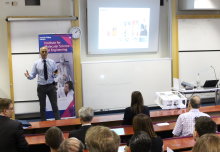

Professor Philip Withers
Correlation and collaboration
Professor Philip Withers delivered the penultimate Institute for Molecular Science and Engineering (IMSE) Highlight Seminar of this academic year.



Correlation and collaboration
Professor Philip Withers delivered the penultimate Institute for Molecular Science and Engineering (IMSE) Highlight Seminar of this academic year.


Making better batteries
Research focused on upscaling of energy-storage devices was presented by Dr Billy Wu and Professor Jason Riley in an IMSE Lunchtime Seminar last week.
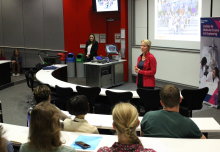

Innovation by evolution: bringing new chemistry to life
The Institute for Molecular Science and Engineering (IMSE) hosted Professor Frances Arnold to deliver an inspiring Highlight Seminar this week.
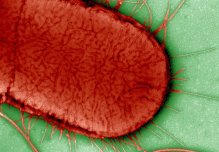

Virus’s bug-busting tactics inspire new approach to tackling infections
Fresh insights into how viruses infect bacteria could provide the basis for a new way to tackle antimicrobial resistance (AMR).


CRUK funds Imperial experts’ plans to develop early cancer screening tests
CRUK has given a multidisciplinary team £290,000 to develop tests for early diagnosis of prostate cancer.


Artificial cells-in-cells triggered by light act as mini chemical reactors
Artificial cells that release materials when exposed to light have been embedded in a durable membrane, allowing chemical reactions to be controlled.
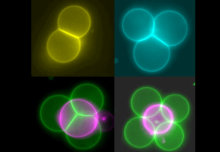

Mini tractor beams help arrange artificial cells into tissue structures
Researchers have used lasers to connect, arrange and merge artificial cells, paving the way for networks of artificial cells that act like tissues.
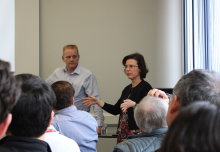

Sustainability across scales: from supply chain to molecules
The Institute for Molecular Science and Engineering (IMSE) held their inaugural Lunchtime Seminar of 2018 last week, on the topic of green chemistry.


Top honours for three Imperial chemists
Three Imperial academics have won prizes in this year’s Royal Society of Chemistry Awards, including Chemistry World Entrepreneur of the Year.
 1
1


Tuneable genetic ‘clocks’ might lead to improved biotech strategies
Imperial scientists have worked out how to fine-tune cellular clocks, which might lead to optimised production of drugs, biofuels and other chemicals.
 1
1